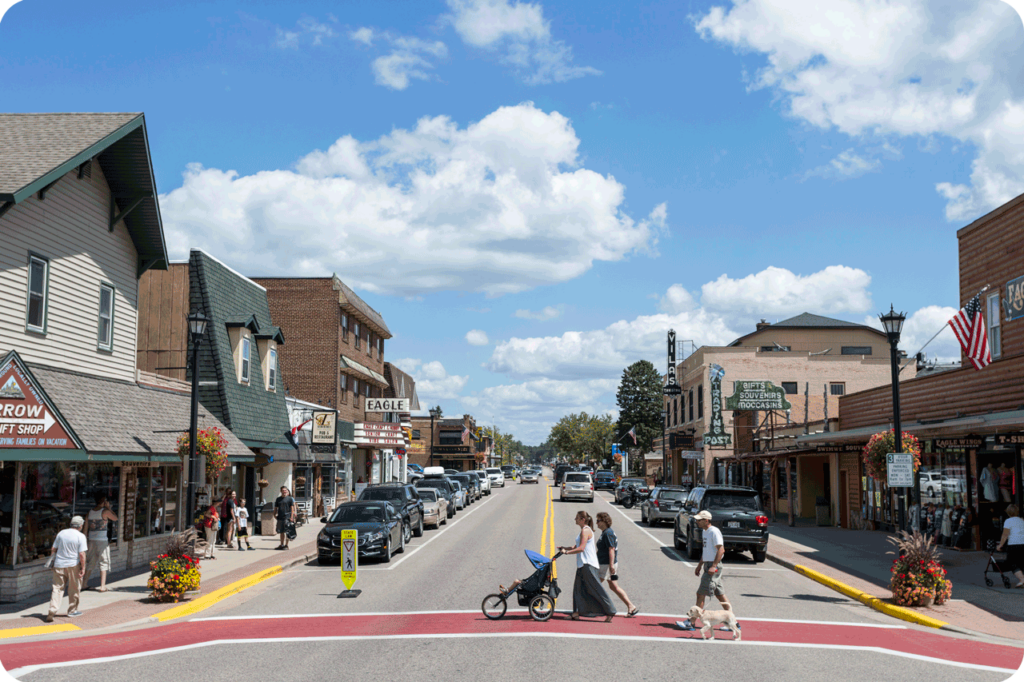
The look and feel of a district upon arrival will determine if a visitor to your community chooses to stop. Downtown Eagle River immediately appears walkable, offering colored sidewalks and pedestrian amenities, and colorful outdoor merchandising and open flags create a sense of vibrancy.
Even if your community is not a popular tourism destination, it is worth the effort to evaluate the first impression that your community provides to visitors in both the physical and virtual world. Communities that make it easy for newcomers to experience and engage with town assets will come across as more welcoming and will offer a better experience. This article highlights some tips for communities looking to assess and improve their appeal, featuring input from statewide influencers and the experience of communities that have engaged these individuals to put their best foot forward.
Online impressions
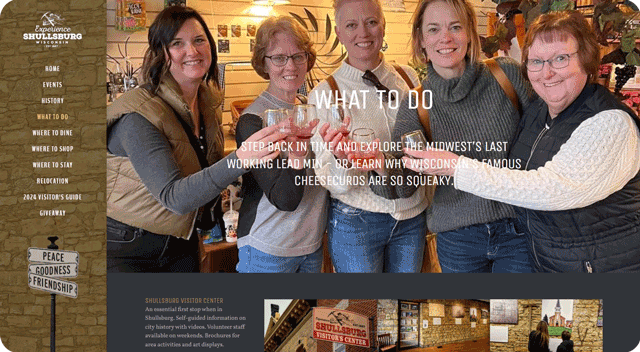
This externally focused site features numerous photos, curated and clear lists, and a one-stop-shop approach to planning a visit to Shullsburg.
In today’s world, virtually anyone looking to plan a vacation, new business venture, or relocation will start the research process online. A recent study by Kantar TNS market research found that 95% of tourists booking trips researched online, with one quarter researching exclusively online and 8% on cell phones only. At a recent Wisconsin Main Street workshop, a panel of influencers indicated that their preferred research portal was Instagram, using hashtags and location searches to jumpstart research into a new community. Most communities offer online resources, but not all are effective at meeting the needs of external audiences.
What should you do to improve? Review your website for the following elements that are particularly useful for orienting outside visitors to your community:
- Maps that provide a spatial context of your district and convey critical information, such as access points, proximity of destinations, parking, and restrooms.
- Photos that convey the district’s aesthetics help visitors envision what the experience will be like. These photos also provide critical information for specific destinations, such as trail surfaces, topography, and amenities that may be important to visitors.
- Directories that help visitors identify key destinations that meet their needs. Searchable categories, curated itineraries, or listings with symbols help filter options to create a positive experience. Businesses that are pet-friendly, family-friendly, outdoor dining, and other specific categories keep the user in mind over more generic list formats. For communities looking to engage with tourists, it is important to highlight businesses that are open evenings and weekends, helping visitors plan their trips effectively and prevent disappointment.
- Calendars and event or activity profiles that provide additional information on elements likely to attract new visitors. These listings can offer tips and strategies for first-time visitors, such as tips for event or destination parking, things to bring, time to arrive, and how long the average visitor spends, etc., which can help set expectations and improve the experience, thereby creating a repeat visitor.
Social media posts should also strive to convey the sense of the place—photos with people, short videos that help viewers feel that they are part of the event, and descriptions that entice the senses to create engagement and interest. Make sure to tag posts with any hashtags commonly used by your community (or start one, if none exist) and partners to help viewers identify and explore areas of interest.
In-person experience
It is important that the community experience matches the online presence. Gateway, wayfinding, and pedestrian directional or interpretive signage systems direct visitors to key destinations and let them know when they arrive. Attractive streetscapes, landscaped parking lots, and clean and inviting public spaces play a significant role in shaping perceptions of a place.
While entertainment, dining, and shopping may serve as an initial draw, offering plenty of things to do in the district overall—such as walking tours, giant games, and parks with comfortable seating areas can add options to keep visitors entertained for longer or during off-peak periods. Be sure to include informational and welcoming signage for these amenities as well—QR code signage at a mural might provide information on the artist and also link to a self-guided walking tour, while signage at a pocket park inviting users to enjoy the space may be just the invitation they need to enter the space.
According to panelists at the workshop, the top amenities that generate a response from followers include dog-friendly spaces, rental opportunities (i.e., boats, bikes, etc.), public art, walkable and bikeable places, and attractive green spaces. Adding these elements into your district or making them more visible to visitors creates a sense of vibrancy, while photo-friendly elements encourage visitors to share their experiences on social media, further leveraging these assets.
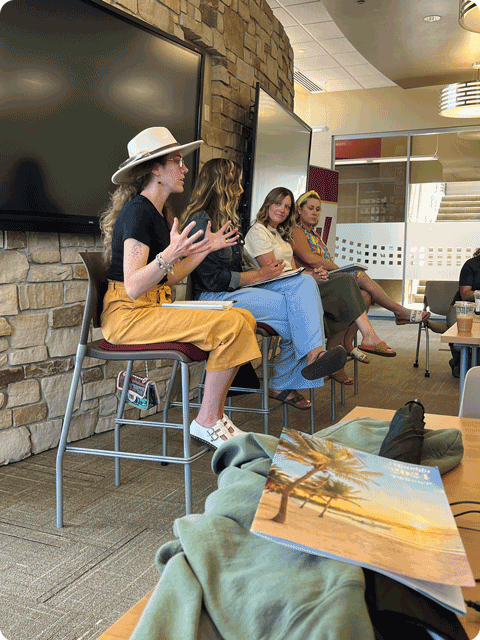
A panel of influencers shares thoughts on what communities can do to ensure visitors feel welcome immediately upon arrival.
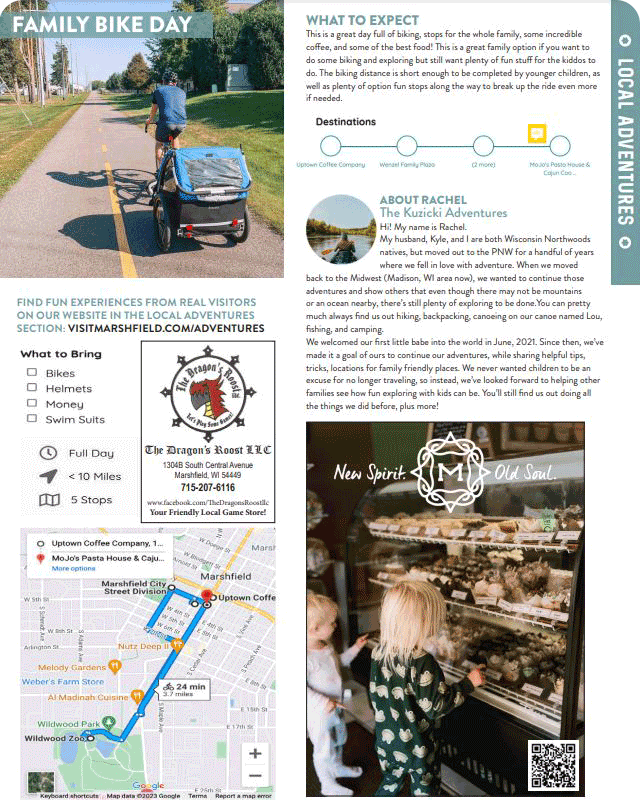
There are multiple ways to engage with influencers. In Marshfield, the community worked with the Shrpa platform to engage multiple influencers of various backgrounds. According to Visit Marshfield director Matt McLean, “The cost was slightly higher, but it required less hand-holding and staff time to generate results.”
Working with influencers
Once your community has put the pieces in place to offer a good experience, working with influencers can be a great way to reach a broader audience that matches your targeted demographics. Before engaging influencers, it is important to have a defined goal in mind. Understanding what success looks like and what image you want to convey will help you pick the right partners and develop appropriate content ideas and potential agendas. Remember that there is a fine line between authentic and staged content—the ideal partnership will match an influencer with destinations that resonate with their audience, leading to engaging content. Planning an influencer visit is a natural opportunity to engage with local partners. Partnerships can help funds go further, ensure that content represents the community, and provide additional outlets to promote and share content once created. These partners can be local or regional such as tourism partners, or statewide, such as Travel Wisconsin, which helps match influencers with communities and destinations.
Tracy Bliss, director of marketing and public relations with Visit Beloit, Inc., shared her experience working with three Chicago-based influencers in 2023. The campaign aimed to create brand awareness in a large potential audience. Visits highlighted a family getaway, a romantic getaway, and a girlfriends’ trip. “As they were sharing photos on their social media pages, we saw our followers increase, and two of them included great blog posts that we could link back to our website as well. Bringing in influencers is also a great way to collaborate with our partners and let them know that we are truly encouraging our visitors to spend time at their businesses,” Tracy said.
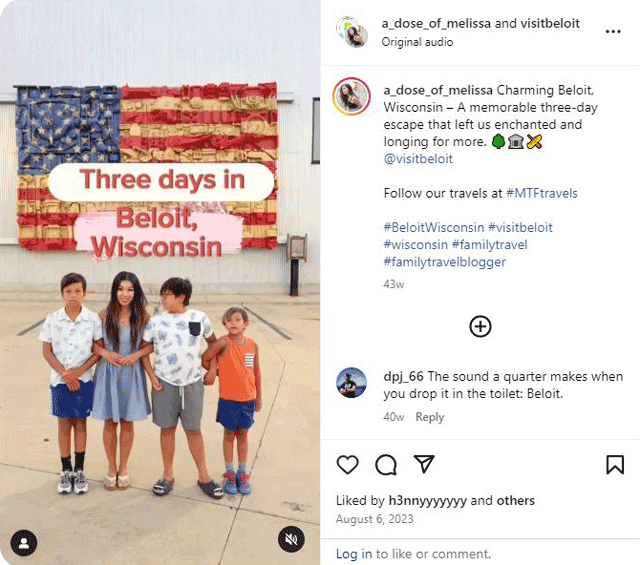
A recent campaign featuring Chicago-based influencers generated significant photo and video content, as well as exposure for Visit Beloit and its partners.
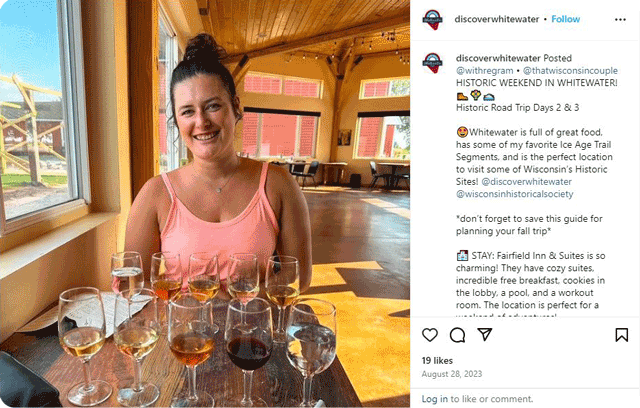
Highlighting local destinations from a variety of perspectives can help reach different audiences. Asking multiple influencers to combine local hiking with shopping and dining in Whitewater generated multiple itineraries and associated imagery for targeted marketing.
While the initial exposure following a timely post can be a boon for tourism, the long-term opportunities associated with future exposure on “Top 10 Hikes” or “Favorite Cheese Curds” lists as a result of the coverage are also valuable. According to Katy Daixon Wimer with Discover Whitewater, “each of our influencer partnerships has resulted in a tremendous boost to Whitewater, with their exponential [number] of views and continue to give Whitewater exposure when they do round-up and best-of post series.”
For communities interested in encouraging outside exposure, start by understanding which accounts or destinations are currently telling your story online. Assist existing businesses and accounts to maximize their appeal, whether by engaging professional photographers, providing social media assistance, or just creating a network of local businesses and civic partners committed to promoting one another to grow the collective audience. Take the time to survey visitors on the website and in person to find out what questions they are trying to answer, what information is missing, or how their experience could be better. Listening to feedback is the easiest way to identify priority improvements.
For those ready to explore the world of influencer marketing specifically, The Wisconsin Department of Tourism also offers some recorded trainings on this topic for anyone looking to engage with influencers in the state.
